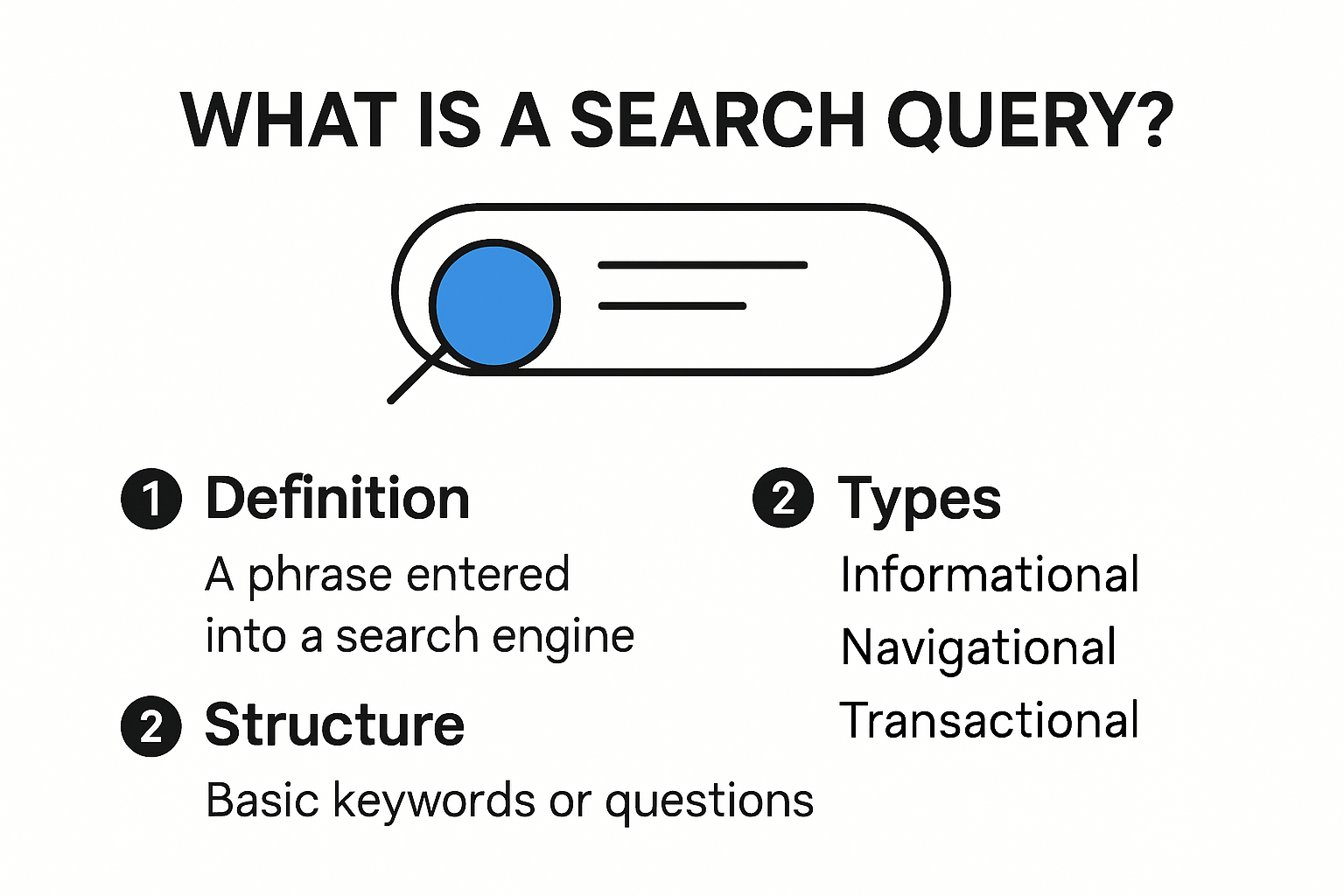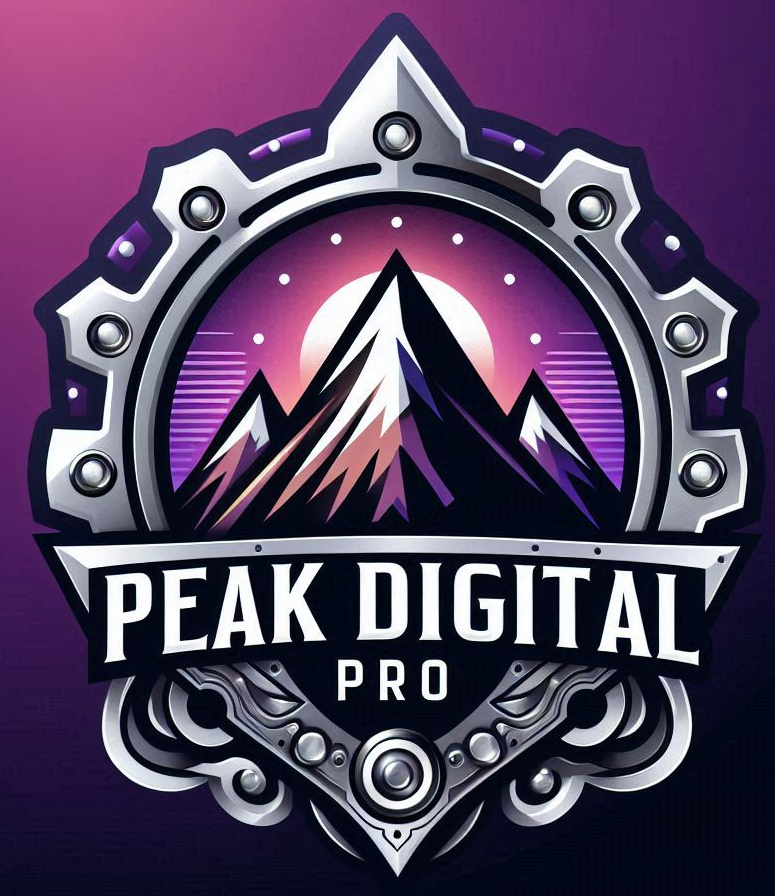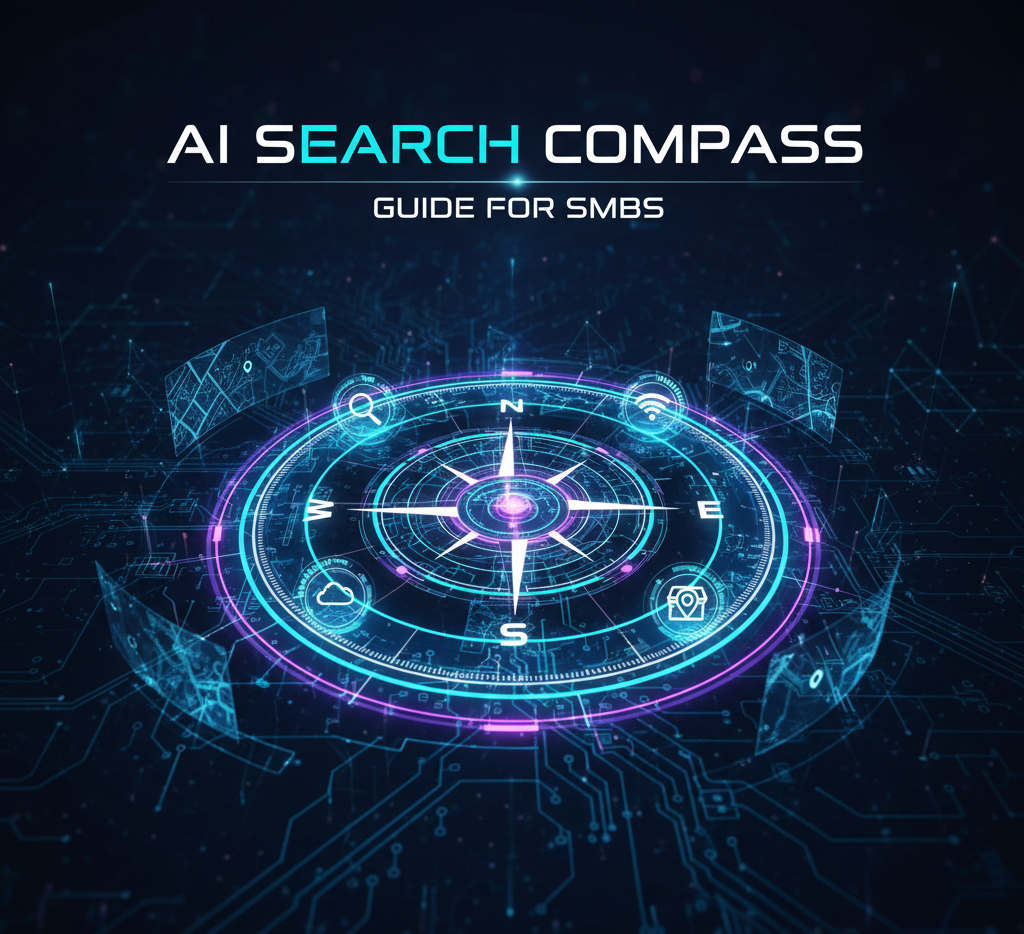What Is a Search Query? Guide for U.S. Business Owners 2025
Most people think a search query is just what you type into Google. Simple enough, right? Actually, there is a lot more happening behind the scenes than you might expect. Search Engines in Colorado are projected to reach a $2 billion market size by 2024 and that means search queries shape the way local companies grow and connect with customers. What looks like a few words on a screen is now one of the most important tools any business owner can use.
Table of Contents
Quick Summary
| Takeaway | Explanation |
|---|---|
| Understand search query types | Recognizing informational, navigational, and transactional queries helps in tailoring content effectively. |
| Analyze user intent deeply | It’s crucial to go beyond keywords and understand the motivations behind searches to create relevant content. |
| Optimize for local visibility | Businesses in Colorado should focus on hyper-local strategies to connect better with their regional audience. |
| Align content with search queries | Develop detailed content that directly answers user questions, enhancing engagement and visibility. |
| Prioritize technical optimization | Ensure your website is fast and user-friendly to improve search query performance and user experience. |
Understanding What a Search Query Means
A search query represents the specific words or phrases users type into search engines like Google when seeking information, products, or solutions. For business owners, understanding the nuanced mechanics of search queries can unlock powerful strategies for connecting with potential customers and improving online visibility.

The Anatomy of a Search Query
Search queries are more complex than simple keyword strings. They reflect user intent and can be categorized into three primary types. Google Search Central explains that these types represent different stages of user exploration:
- Informational Queries : Users seeking knowledge or answers. Example: “How do small businesses improve SEO?”
- Navigational Queries : Searches targeting a specific website or brand. Example: “Peak Digital Pro marketing services”
- Transactional Queries : Searches indicating intent to purchase or take action. Example: “affordable SEO packages for small business”
Understanding these query types helps businesses craft targeted content that precisely matches potential customer needs. Each query type signals a different stage in the customer journey, requiring unique strategic approaches.
Here is a table summarizing the three main types of search queries with examples and business strategies for each:
| Query Type | What Users Want | Example | Business Content Strategy |
|---|---|---|---|
| Informational | Knowledge, answers, how-tos | “How do small businesses improve SEO?” | Create blogs, guides, FAQs that answer questions |
| Navigational | Find a brand/site/service | “Peak Digital Pro marketing services” | Optimize about pages, service listings, Google My Business |
| Transactional | Make a purchase or action | “affordable SEO packages for small business” | Develop landing pages, product/service pages, clear CTAs |
Search Query Mechanics and Business Impact
Search queries are the fundamental bridge between user needs and online content. Moz’s Keyword Research Guide reveals that sophisticated search algorithms analyze multiple factors beyond mere keyword matching. These include:
- Search Intent : The underlying motivation behind a user’s search
- Contextual Relevance : How well content matches the broader query context
- User Location : Geographic factors influencing search results
- Search History : Previous user interactions and preferences
For business owners, this means creating content isn’t just about using keywords. It’s about understanding the deeper psychological and informational needs driving user searches. Successful digital marketing strategies recognize that search queries are conversations between users and businesses, requiring nuanced, empathetic communication.
By comprehending search query mechanics, businesses can develop more intelligent, targeted content strategies. This approach transforms search queries from simple text inputs into strategic opportunities for customer engagement and business growth.
Types of Search Queries and Their Purpose

Search queries are not a monolithic concept but a diverse ecosystem of user interactions with digital platforms. Wikipedia’s research on web queries reveals that understanding the nuanced types of search queries is crucial for businesses aiming to optimize their digital presence and connect effectively with potential customers.
Structural Categories of Search Queries
Search queries can be distinguished by their structural complexity and user intent. Columbia State Library’s research identifies three primary structural approaches to searching:
- Keyword Searches : Direct entry of specific words to retrieve relevant documents
- Phrase Searches : Targeting exact sequences of words for precise information retrieval
- Proximity Searches : Finding words situated within a specific distance from each other
These structural variations demonstrate the sophisticated ways users interact with search platforms. Each approach reveals different user strategies and information-seeking behaviors, providing insights into potential customer mindsets.
Below is a table outlining the three structural categories of search queries, including their descriptions and use cases as discussed in this section:
| Structural Category | Description | Use Case Example |
|---|---|---|
| Keyword Searches | Entering single words or simple combinations | “SEO Denver” to find broadly related results |
| Phrase Searches | Using quotation marks for exact word sequences | ““best SEO services in Boulder”” to get precise matches |
| Proximity Searches | Finding words within a specific distance of each other | “SEO NEAR Denver” to find results where terms are close together |
Exploratory Search and User Intent
Exploratory search research highlights a more complex dimension of search queries. This approach goes beyond simple information retrieval, representing a dynamic process where users investigate, evaluate, compare, and synthesize information when they are uncertain about their goals or domain knowledge.
For business owners, understanding exploratory search means recognizing that potential customers are not always looking for immediate answers. Instead, they might be:
- Learning about a new product category
- Comparing different service options
- Gathering comprehensive information before making a decision
This insight transforms how businesses approach content creation. Rather than focusing solely on direct conversions, successful digital strategies must provide comprehensive, educational content that supports users through their entire decision-making journey.
By comprehending the multifaceted nature of search queries, businesses can develop more nuanced, user-centric digital marketing approaches. This strategy moves beyond traditional keyword optimization, creating meaningful connections with potential customers by understanding and addressing their complex information needs.
Why Search Queries Matter for Colorado Businesses
Search queries represent more than simple digital interactions for Colorado businesses. They are critical pathways connecting local entrepreneurs with potential customers, driving visibility and growth in an increasingly competitive digital marketplace. IBISWorld research indicates the Search Engines industry in Colorado is projected to reach a market size of $2 billion by 2024, highlighting the profound economic significance of digital search strategies.
Local Market Visibility and Digital Positioning
For Colorado businesses, understanding search queries is not just a technical exercise but a strategic imperative. The digital landscape demands precise, targeted approaches that align with local consumer behaviors. By analyzing search query patterns, businesses can:
- Optimize local content for regional search preferences
- Target specific geographic market segments
- Develop hyper-local marketing strategies
Understanding these nuanced search behaviors allows businesses to create content that resonates deeply with Colorado consumers, increasing their chances of digital discovery and engagement.
Data-Driven Business Intelligence
The Colorado Information Marketplace provides critical insights into how digital information networks function within the state. Search queries serve as valuable data points that reveal:
- Consumer interest trends
- Emerging market opportunities
- Seasonal business fluctuations
- Competitive landscape dynamics
These insights transform search queries from simple user interactions into sophisticated business intelligence tools. Colorado entrepreneurs can leverage this data to make informed strategic decisions, anticipate market shifts, and develop more responsive business models.
Search queries are no longer passive digital interactions but active strategic assets. They provide a real-time window into consumer psychology, market trends, and competitive positioning. For Colorado businesses willing to invest in understanding these digital signals, search queries represent a powerful mechanism for growth, adaptation, and sustained market relevance.
How to Use Search Queries to Boost Online Success
Boost your business’s online visibility by strategically leveraging search queries as powerful digital marketing tools. Search queries are not just random text inputs but sophisticated pathways that connect businesses with potential customers. Understanding and optimizing for these queries can transform your digital presence and drive significant business growth.
Strategic Keyword Research and Optimization
Business.gov.au emphasizes the critical importance of understanding customer search behavior for improving online visibility. Effective keyword research involves more than simply identifying popular terms. Businesses must:
- Analyze search intent behind keywords
- Identify long-tail keyword opportunities
- Match content precisely with user expectations
- Understand semantic variations of key search terms
Successful keyword strategies go beyond volume. They require deep insights into how potential customers think, search, and seek solutions. This approach transforms keyword research from a technical exercise into a nuanced understanding of customer psychology.
Content Development and Search Query Alignment
Creating content that directly addresses specific search queries is fundamental to online success. This means developing comprehensive, authoritative content that:
- Answers specific user questions
- Provides in-depth, valuable information
- Demonstrates expertise in your business domain
- Addresses multiple stages of customer journey
Content should not just include keywords but provide genuine value. Search engines increasingly prioritize content that comprehensively addresses user needs, rewarding businesses that create substantive, informative resources.
Technical Search Query Optimization
Beyond content, technical elements play a crucial role in search query performance. Businesses must focus on:
- Website loading speed
- Mobile responsiveness
- Clear website structure
- Proper schema markup
- Consistent metadata optimization
Technical optimization ensures that when potential customers perform search queries, your website appears prominently and provides an exceptional user experience. It transforms search queries from mere discovery mechanisms into genuine engagement opportunities.
By approaching search queries as strategic assets rather than simple search inputs, businesses can create powerful digital marketing strategies. This holistic approach connects technical optimization, content development, and deep customer understanding to drive meaningful online success.
Frequently Asked Questions
What is a search query?
A search query is the specific word or phrase that users type into a search engine to find information, products, or solutions.
Why do search queries matter for businesses?
Search queries are crucial for businesses as they drive visibility, connect with potential customers, and help inform content strategies to meet consumer needs.
What are the different types of search queries?
Search queries can be categorized into three types: informational (seeking knowledge), navigational (looking for a specific site), and transactional (intent to purchase).
How can businesses optimize for search queries?
Businesses can optimize for search queries by performing strategic keyword research, aligning content with user intent, and ensuring technical optimization for better website performance.
Unlock Real Growth from Every Search Query
Are you struggling to turn traffic into loyal customers, even with detailed search query analysis? This guide highlighted how understanding informational, navigational, and transactional queries is essential for connecting with your real audience. But knowing what users search for is just the starting point. Without the right digital strategy, those valuable insights can disappear into the noise and your competitors can outrank you.

It is time to transform your business from simply understanding search queries to dominating them in the Colorado market. At Peak Digital Pro , we combine advanced SEO optimization, expert web development, and AI-powered marketing insight so your business shows up exactly where your customers are searching. If you want to capture more customers at every stage of their journey, start your next chapter now at https://peakdigital.pro. Work with specialists who translate search data into measurable sales and lasting visibility.








